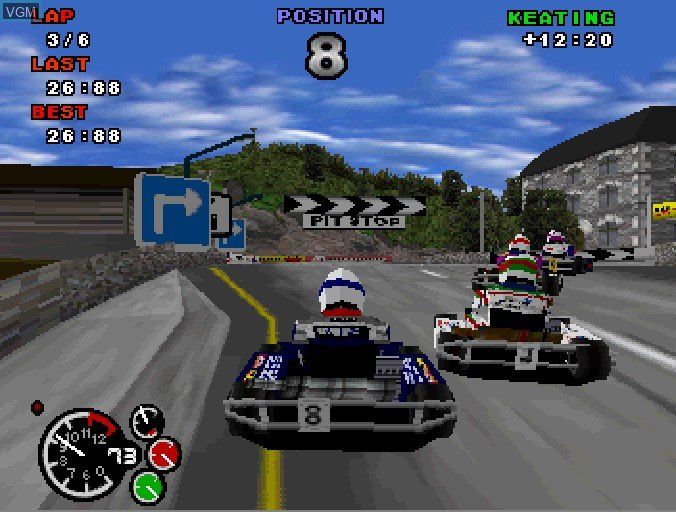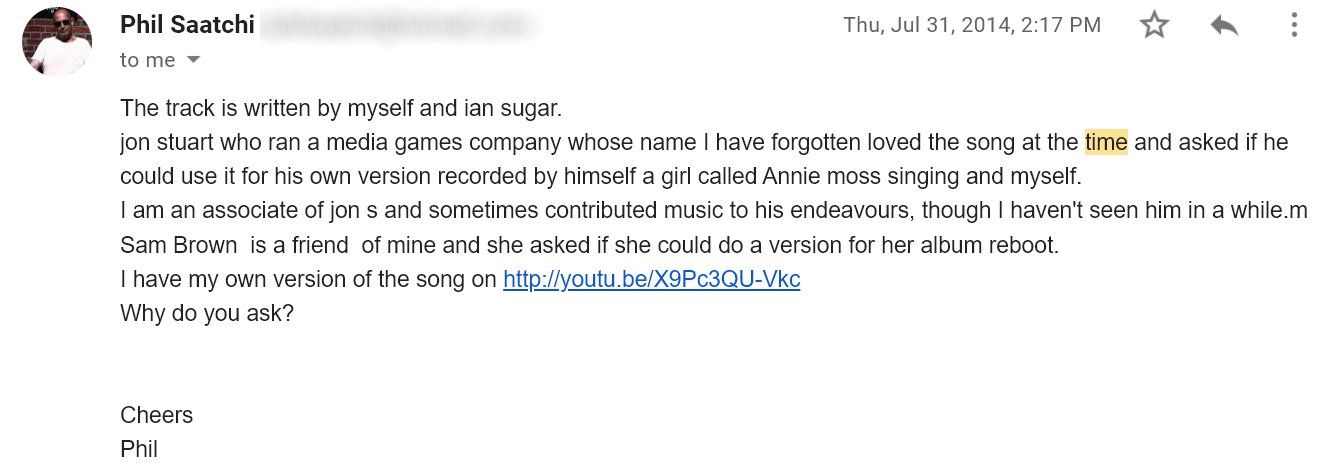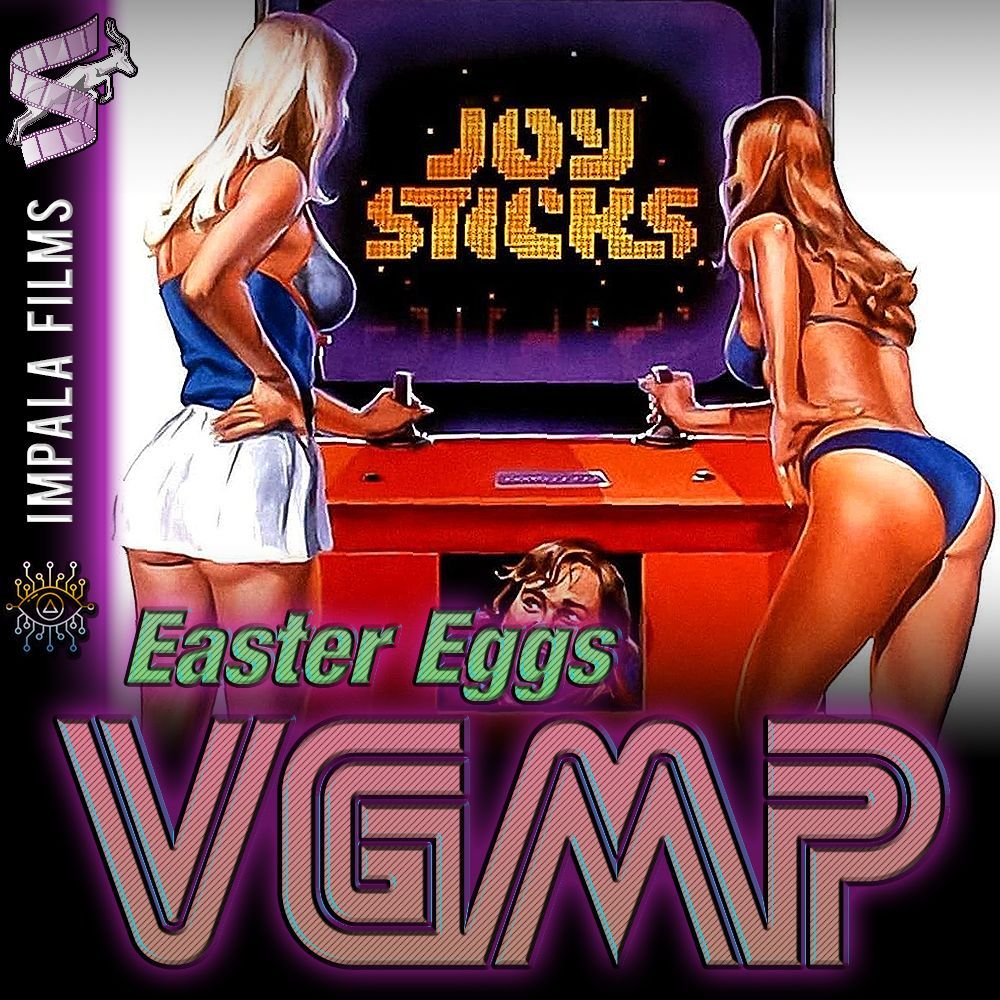[VGMP] The Tune, the Kart and the Saatchi
Rory Joscelyne • 8 March 2022
VGMP: EXCLUSIVE on Sega Saturn's Hidden Song

Formula Karts was a 1997 go-karting "simulator" released on the Sega Saturn, Sony Playstation and PC. It was produced by UK-based Manic Media Productions Ltd, whose only other games were two 1995 releases - Super Karts and Manic Karts. On the Saturn and PC, it was published by SEGA themselves.
So far, so bland. Some generic Karting game, released in only one region and has been lost to the annals of time. Why are we talking about this
now?
Well, Formula Karts on the Sega Saturn and Sony Playstation (named Formula Karts: Special Edition) has a unique song on the disc - one never
utilised in game and can only
be heard by sticking the disc into a generic CD player - a song titled "Timebomb". This song is not
an official part of the soundtrack, and doesn't fit into the audio scored (and licenced for) the game - but it has a unique legacy.
To showcase why it doesn't fit in with the game, let's start off with a sample of Formula Karts' actual soundtrack.
As you can hear, Formula Karts' soundtrack has a distinctly mid-90s Trance vibe throughout. This soundtrack is credited to Martin Simpson, Jon Stuart and J. Philips with the sole exception being the then-popular trance track "36 Weeks" by The Thrillseekers, which was licenced for the Japan course in the soundtrack.
However Timebomb isn't a Trance song. It has an almost country-rock vibe to the sound. Listen to it below to hear just how misplaced it sounds.
So what's going on here? Why is there a random song pressed on an old video game CD, who made it and has the song ever seen a proper retail release? Well, we can now exclusively
reveal the answers to all of those questions!
Let's discuss a retail release first - does Timebomb exist in an official, purchasable format? Yes. Yes it does.
A female musician, Sam Brown, released the track as part of her
ReBoot album. I'll include a link to her
Spotify track here, but for expediency I'll also have a playable version below. If you like the song, please support the artist.
But Sam Brown's release isn't
the origin of this song. Not only is she clearly not the vocalist on the Formula Karts iteration, but she also released her album three years after
the release of Formula Karts. You can search and search, from discogs to wikipedia, you'll find no earlier release of this song - yet here it is. Clear as day. The enigma that is "Track 11" - Timebomb.
Before we move on to my investigation, I will note that there are some lyrical changes between the Formula Karts and Sam Brown iterations of Timebomb. The main structure and chorus are largely intact, as is the first verse, but the second verse sees the lyrics deviate quite heavily and the third verse is missing in the Formula Karts version - showing that the track was improved upon in the missing three years.
Here are the lyrics for each version for comparison.
So what's going on? Is this proof of time travel (now that would be a real timebomb)?
To try and get some clarity I
contacted Martin Simpson, one of the credited musicians on Formula Karts. I was unable to locate a contact for Jon Stuart and I couldn't determine exactly who J. Philips was as I was unable to verify their first name. This immediately hit a dead end when Martin Simpson simply responded by saying he had no connection to the track whatsoever. So I had to dig deeper. I went on the Wikipedia page for Sam Brown's album and found something interesting. While most of the album was written by Sam Brown, it was revealed she had no hand in writing Timebomb. The credited writers were Ian Sugar and Phil Saatchi.
Phil Saatchi is the fourth of the Saatchi brothers, with the more renowned two being Charles Saatchi (the owner of the Saatchi Art Gallery in London, England) and Maurice Saatchi (who, along with Charles, co-founded the famous advertising agency Saatchi & Saatchi). Phil has no direct involvement in his brothers' businesses and instead has a storied career as a music producer in Brighton, England.
Phil was kind enough to respond to my emails asking about this elusive song, and was even able to namecheck those involved in the recording.

NOTE: That Youtube link is now dead, however I'll link to his new upload at the end of the article.
He mentions Jon Stuart ran a media games company (as well as being a musician). Looking over the credits for Formula Karts again shows Jon Stuart is credited as the Producer and Director of the game - so it's likely the company he ran was Manic Media Productions itself. The track was written by Phil Saatchi and Ian Sugar and was performed by Saatchi, Stuart and a vocalist called Annie Moss.
There is
an album release in 1997 that verifies Phil Saatchi and Annie Moss working together, seen here on
discogs - Virginia MacNaughton's album "The Music". Phil Saatchi seems to have been heavily involved in the production of this album, with Annie Moss providing Backing Vocals on the track "'Til Hell Freezes Over" and both Flute and Piano on the track "Senseless Thing".
I responded to Phil, asking if he could give me any more information on the song's age, previous releases or if it had been performed at live gigs prior to Sam Brown's release. I also asked him to confirm any potential involvement from Martin Simpson or J Philips on the track.

He verifies that the only official release was Sam Brown's album release, however the song was played by Phil and a band at various live gigs prior to this. This is likely where Jon Stuart first heard it, and requested to record a cover of it himself. Phil also verified that he didn't know J Philips so we can remove them from the production of the song entirely.
According to Phil's recollection, Martin Simpson worked as the engineer on the recording session and potentially contributed musically to it - despite this running contrary to Martin Simpson's own response. This isn't unusual as there could be a case of misremembering going on. Either Phil Saatchi is misremembering the engineer who worked on the track, or Martin Simpson doesn't recall working on the session - not unusual, as the session would have been less than a day's work decades ago.
As to why the track is included on the Sega Saturn and Sony Playstation discs? We couldn't get any verification on this. It's likely that Jon Stuart wanted to release the track, or show it to his friends, and the only route to release available to him was on a game disc (since that was his company's focus). But this is all speculation. Without contacting Jon Stuart, we'll never get the answer to that elusive question.
Before you go, please give a watch/listen to Phil Saatchi's own video release of this track to support the artist. I really love this version he recorded with Jet Cohen and the Aerials. Lyrics are almost identical to the Sam Brown version, although the performance and vocalisation are very different.
CHECK OUT OUR PODCAST AT www.vgmovie.co.uk

Blue Streak, speeds by... Sonic the Hedgehog (2020) is Hollywood's first big blockbuster attempt to bring Sonic to the big screen. A much more popular effort than the 1996 anime movie, this one sees Sonic come into the "real world", but that doesn't mean that it isn't jam-packed full of Easter Eggs. And some of them are references to other Sega franchises.

First things first - DO NOT WATCH THIS MOVIE. Kung-Fu Master may have the licence for the game, and it may include a few scenes at Arcades, but the story is nothing to do with gaming - and the story it represents is a literal crime. A vile, vile crime. With that out of the way, there are some interesting arcade machines visible throughout this film - all of which are here. So you have been saved from having to watch this vile garbage - and saving you the criminal act of watching it.

Also known as Sonic the Movie, the Japanese OVA was actually a run at a possible series that never materialised, instead leaving us with two episodes hastily stitched into a "feature". And boy, did they push taste and decency for some of this. Other than Robotnik chasing underage skirt, it's largely inoffensive. But unfortunately that story angle wound up kick-starting a long running VGMP joke of Sonic adaptations having to reference breast milk (which the 2020 Sonic movie also references).

I love The Wizard. It's so bad. The first major disagreement between Rory and Jamie in VGMP, Rory fully recommended The Wizard as a movie, whereas Jamie fully rejected it. It's not hard to see why this movie caused such a rift of opinion - it genuinely tries to be a deeper and emotional story, but it's still a Nintendo marketing product (and an out of date one, at that). One thing The Wizard does have, is a lot of videogame references.

The House of the Dead movie brings together two major events in film. It's the first foray by Uwe Boll into video game adaptations - the start of a terrible career. And it was the last ever movie to use the turn-table technique for 360 degree shots, as it was too dangerous to keep using - much like allowing Uwe Boll to have a film career. This film doesn't have many proper references, instead lazily throwing in random micro-shorts from the first three House of the Dead games (in no particular order, for some reason).

The first appearance of Jon Gries in a video game culture movie, and he would return in Noobz (2012) to steal yet another movie. Joysticks is an awful comedy movie, attempting to cash in on cheap teen humour of the time with a big dose of objectifying women. But to it's credit, it does showcase a lot of great arcade cabinets from 1983, and all in fantastic condition too! These screengrabs are ripped from the limited-run Blu-Ray release of the movie, which represents the best this film has ever looked. However this was a relatively low budget feature of it's time, so don't expect prestine visuals.

Tron is an undisputed 1982 classic that had a major impact on 80's culture and gaming aesthetics as a whole. And yet, when we reviewed it, it turns out the movie itself is a big bag of style over substance. The main videogame the movie revolves around is Space Paranoids, and it is not a real game. Several videogames were later made of Tron, but none of those appear in this movie.

Gamebox 1.0 is an odd 2004 movie starring the guy who played Harvey in Sabrina the Teenage Witch. You could technically call it a dramatic horror, if any of it was dramatic or a horror. As you can see from the shot above, the details were so vital to this film that there's a guy at "work" just staring at a blank screen. Regardless of the low budget nature of the film, there are still a surprising number of references hidden in this movie.





